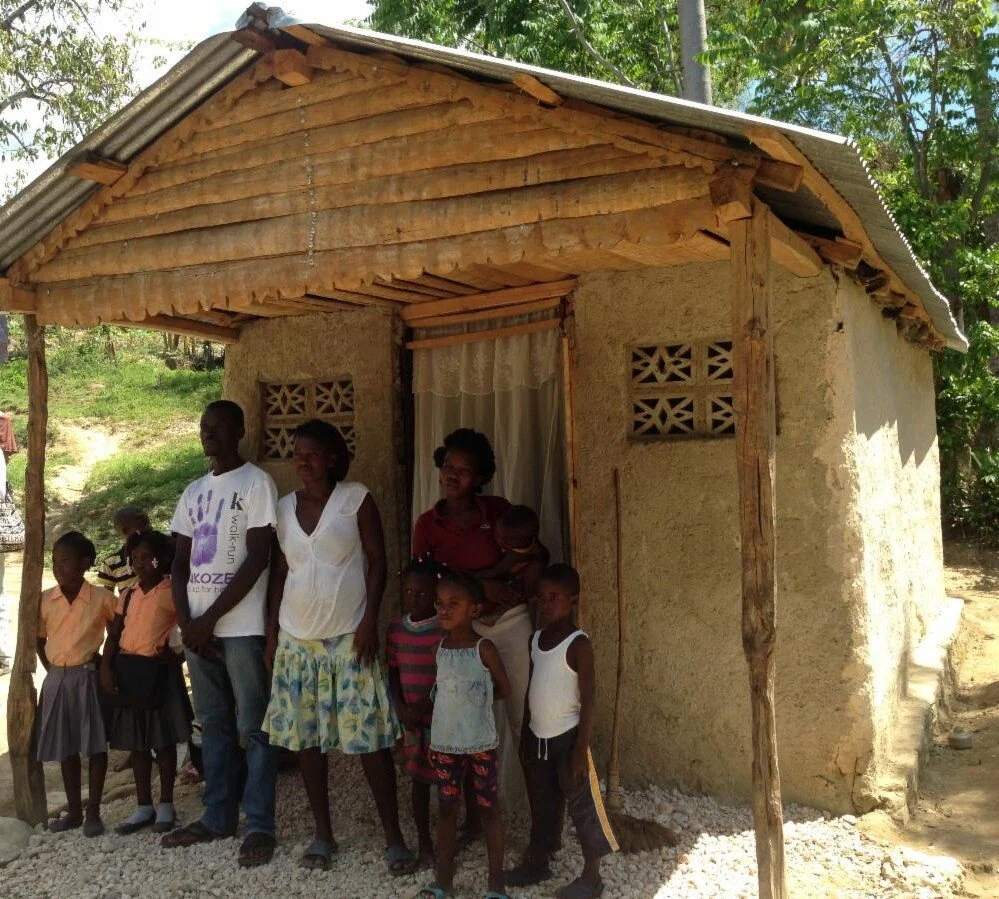I’m Hungry!
“Grangou! Grangou!” shouted the children who stood outside the wall trying to get our attention. “Grangou” means hungry In Haitian Creole. It was May 1997 when my family and I sat at an outside table at La Jacmelienne Beach Hotel in Jacmel, Haiti. We were having a light lunch, a luxury in Haiti, of a simple chicken sandwich. When I say “simple” I am not referring to the no small effort it took to just get this food in front of us by the staff at the hotel. René Préval was in his second year as the President of Haiti and would serve a full term. Haiti had previously had ten – that’s right, 10 – presidents in the eleven years since the corrupt and ruthless Baby Doc Jean-Claude Duvalier had been overthrown in 1986. Though progress is hard to measure in Haiti, Préval was a good president. He was so good that the US Peace Corps had renewed their presence in Haiti in 1996 after a period of much instability.
It was the Peace Corps’ renewed presence that took us to Haiti to see our son, who had been sent there as a new volunteer in 1996. (the Peace Corps would again suspend their presence in Haiti in 2005). As we sat there and ate our meal, Haitian children were gathered outside the wall and were peering in on us. They shouted, “grangou!” It troubled us. Here we were a family of well-fed Americans (except for my son who had lost a significant weight from his time in Haiti) enjoying a luxury while hungry Haitian children begged outside the wall.
God is Not Pleased
The scene reminded me of the story Jesus tells in the 16th chapter of the Gospel of Luke. We hear of an extraordinarily rich man who dressed in fine clothes and dined scrumptiously every day. Outside his gate lay a poor man, Lazarus by name, who longed for just for a crumb to somehow fall from the rich man’s table. His malnutrition caused sores to break out on his emaciated body. Dogs would come and lick his sores. Lazarus died, and the rich man eventually died too. No matter how wealthy and cushy a lifestyle one enjoys, the death rate is always one death per person.
What follows in the story is shocking. Lazarus is in the bosom of Father Abraham, and the rich guy is in Hades being tortured by the flames. The language of this role reversal is rich and colorful, but the point of Jesus’ story is that God is not pleased at the complete lack of the rich man’s ability to acknowledge the humanity of the poor outside his gate. It is the ultimate picture of tone-deafness in the rich and privileged to the plight of the planet’s underdogs.
The most marginalized people on the planet live in Haiti, suffering from the effects of extreme poverty. Stuck in this cycle and trying to survive on 50 cents a day they can’t afford clean water and go to bed hungry with shame for not being able to send their kids to school. Even worse, extreme poverty has resulted in over a million orphaned children in Haiti and created opportunity for child traffickers, as well as thousands dying annually from preventable diseases. Just a 90-minute flight from America’s abundance, this is a scandal of our shared humanity. God is not pleased.
The Walls of America
As a follower of Jesus, I am troubled by the gates that separate the powerful and privileged and seem to immune them from the ills of humanity. During these last six months of the COVID-19 pandemic in this country, we have experienced a great wall that separates those who can work from home and the front line workers who are necessarily at risk everyday – those in health care, grocery store clerks, meatpackers, and many others. God cannot be pleased at this disparity. There is the great wall that separates the global north from the global south in terms of who is the perpetrator of climate change and those who suffer the most from its consequences. There is the great wall that separates those who can afford to have home tutors for their children from those parents who have to work and have small children who must fend for themselves with remote learning. There is the great wall that blocks black people from protection from police and a fair criminal justice system that others seem to take for granted. There is the ideological wall that separates peaceful Black Lives Matter protestors from often armed right-wing counter-protestors. And there is this great wall that distinguishes folks on what some economists call the K-shaped recovery curve. For the rich and those who have investments, the curve is upward. For the workers, desperate small business owners, and the millions of unemployed and facing evictions, the curve is steeply downward. And in the richest country in the world, there are those who have access to health care and those who do not. God cannot be pleased.
A Shocking Affront
Two weeks ago, there was a live re-enactment of the scene in Luke 16. In the midst of a global pandemic and defying CDC guidelines of social distancing and wearing facemasks, fifteen hundred people gathered on the south lawn of the White House to cheer a political party and its leader declaring itself to be the party of God. For every person who has spent the last six months playing by the rules, staying at home, wearing masks when in public, for every frontline worker who does not know whether the person closest to her is negative or positive for COVID, for every family that has canceled a wedding or a vacation or reunion, for every grandparent who has stayed isolated and has not been able to hug his grandchildren, for every congregation that has cancelled in-person worship, and for the over 190,000 Americans who have died while leadership downplayed the lethality of the virus, this gathering inside the walls that surround the White House was an affront, a travesty. God could not have been pleased.
Jesus Came to Tear Down Walls
Jesus came to tear down the walls that divide rich and poor, male and female, Jew and Greek, gay and straight, black and white, and those who are in and those considered out. As Ephesians 2:14 says, he “has broken down the dividing wall...” Of course, it took the religious elite and the political leaders of the day to have Jesus taken outside the walls of the Holy City, to have him crucified on a garbage heap and for God to raise him from the dead on Easter to finally tear down the wall. Mark’s Gospel is explicit when Jesus breathes his last and the curtain of the temple is torn in two from “top to bottom” (Mark 15:18).
The church that gathers in the name of the risen Jesus is an anti-wall community. It is a community that gathers rather than separates. The genesis of how this Jesus community is to gather and to what it is to witness happened on the night in which Jesus was betrayed when he placed bread in the hands and wine on the lips of all those gathered, including Peter and Judas, and said, “This is my body given for you. This is my blood shed for you.” With that inaugural meal came the promise that the risen Jesus would eat and drink again with us and the instruction from the apostle, Paul, that when we eat and drink the meal we proclaim the Lord’s death and resurrection until he comes again. Jesus’ ministry of the inbreaking of the Reign of God from the feeding of the multitude to his eating with outcasts and sinners bear witness to Isaiah’s poetic portrait of the outcome to which the love, mercy, and grace of God is taking us all:
On this mountain the Lord of hosts will make for all peoples a feast… (Is. 25:6)
It is more than a feast of great food and drink. It is also a celebration of God tearing down and taking away the shrouds and sheets over all peoples, the swallowing up of death, the wiping away of all tears, and the end of disgrace for many. With the possible exception of Revelation 21 and the imagery of God coming to dwell with God’s people there is no greater visual portrait of what it means to say that love and life finally win.
The Common Table
In Decatur, Georgia a new congregation is being birthed out of the death of one of the many traditional ELCA congregations who have met a similar fate because of the stubborn walls of resistance to change and innovation and an unwillingness to meet this era. This new congregation has had to have a sense of humor because it was supposed to have launched with a lot of hoopla on Easter Sunday, April 12th, one month into the stay-at-home orders.
My wife, Harriet, and I are blessed to be a part of this new congregation. It is a congregation informed and shaped by Lutheran theology, but we are not attentive to the trappings of institutional religion. Seeing ourselves as a movement, we also do not spend a lot of time on dogma or doctrine. Our focus is the table – the gathering of all peoples around tables. We call ourselves the Common Table.
In a society fractured by inequity, suffering, and intolerance we all face a choice: to live for our own good or for the common good. Embodying the unshakeable hope and unrelenting grace of the risen Jesus, the Common Table works for justice and equity for those marginalized by society and declares that it has a seat at the table for everyone. As we fight for justice, love all people, journey together, and dream fearlessly in the name of the crucified and risen one, we will replace walls with tables. We do hope God is pleased.
In the abiding hope of the empty tomb,
















